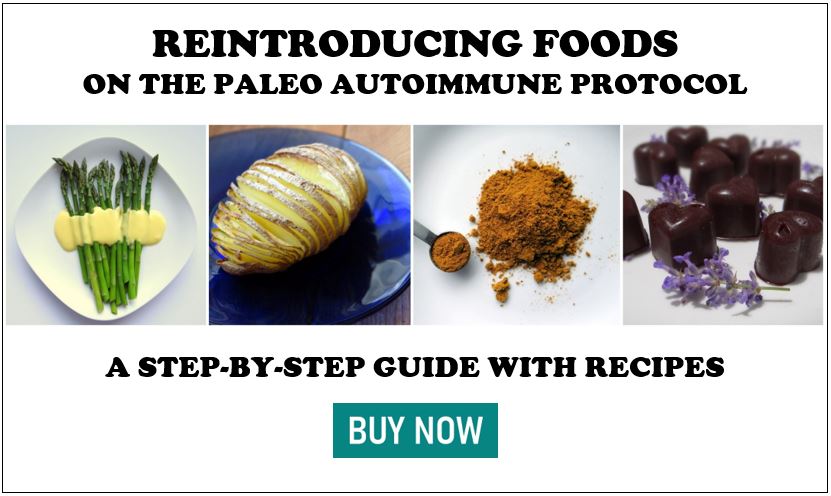“Knowing yourself is the beginning of all wisdom.”
~ Aristotle
This Interview Series
Reintroducing Foods on the Paleo Autoimmune Protocol was my first e-book, which I published back in 2014. I realized that the reintroduction process is often the trickiest part of the AIP journey. It can be confusing, overwhelming, and hard to navigate alone. I wrote the book to guide people through, and thereafter got a nickname: Reintro Goddess. (Just kidding, but wouldn’t that be a great nickname?) I’m passionate about this process for two reasons: (1) Some people make the mistake of thinking the elimination phase of the AIP is meant to last forever. It’s not. It’s just the first step. The next step is personalizing the diet for you. (2) The reintroduction process is an experiment with you at the center, where you learn to communicate clearly with your body, and it’s incredibly empowering! Everyone’s reintroduction experience is unique. I thought it would be inspiring and educational to interview people who have been through this process themselves.
Introducing Mitch Hankins
Mitch is the blogger behind Instinctual Wellbeing. He has Hashimoto’s and Lyme disease, and the paleo autoimmune protocol has been an essential part of his healing journey. He shares AIP recipes on his blog, alongside articles on the mind-body connection.
- How long did you do the elimination phase? I was strict for about 6 months.
- How did you decide that you were ready for reintroductions? Well, it was my functional practitioner who actually put me on the AIP in the first place, so it was with his guidance that I knew after 6 months of AIP (and also taking supplements to help heal my gut and adrenals), that I could slowly begin reintroducing foods and figuring out what felt OK to me. Part of this was me just having to learn to listen to my body because at the end of the day, my doctor didn’t know how I was feeling with certain foods – I had to be able to discern what worked and what didn’t, and which foods caused my symptoms to flare back up.
- What foods have you been able to successfully reintroduce? Today I can tolerate nuts (mostly just almonds; other types of nuts are OK in very small, sporadic amounts, but things like walnuts and pecans can give me problems), chocolate, mustard, black pepper (just with eating out, we still do not cook with it at home), coffee, teas, small amounts of dairy (like butter on a steak or vegetables in a restaurant, or a small piece of chocolate outside the home; again – we still do not cook with dairy at home), green peas, and very occasionally will I have an alcoholic beverage, or maybe an allergen-free cupcake or slice of cake if it’s from a dedicated and trustworthy bakery.
- Which ones can you eat regularly and which ones just occasionally? How did you discern the difference? For me, moderation with everything is key. I do best when I can adopt some sort of unintentional “rotation diet” where I am not eating all of these foods every single day. For instance, I actually do fine eating almonds; however, there was a period where I was eating different preparations of almonds (almond butter, almond flour, almond milk, raw almonds) nearly every single day. After about a month or so of that, I did begin noticing a return of certain symptoms, so I really had to dial things back. Same goes for any of my “reintroduction” foods – if I were to eat chocolate every single day, or have coffee every single day, I would begin experiencing problems after an extended period of time. Things build up, and then my “buckets” can overflow. Most of my discernment has come from trial and error. I find that I’m the type of person who (for better or for worse) will push the boundaries until I know my absolute limits with everything. I’m a very experiential learner. As you can imagine, sometimes this isn’t great for me, but it is effective because then I can learn these types of things! Now I know how much of each food I can have, at what frequency, for how long, etc. I’ve also noticed I shouldn’t try pushing myself with certain types of foods if I am already stressed and inflamed in other areas of my life (work, relationships, etc.) I find my body isn’t as able to tolerate dietary stress when it’s on top of lifestyle stress.
- When food reintroductions failed, what were your symptoms? Headaches, arthritic symptoms (stiffness, joint pain), brain fog, irritability and agitation, fatigue and lethargy, and just a general feeling of “bleh.” (I’m sure you guys know what I mean by that!) Oh, and I’ll also feel my thyroid area become tense as if there’s a ball or rock in my throat. That was my biggest “check engine light” for the longest time – if I ate something and my thyroid felt tight, it meant that food wasn’t agreeing with me.
- Did any reintroduction failures later become successes? Yeah, I’d say most of mine would fall into this category! It’s all about timing, in my opinion. Like I mentioned before: If you’re trying to reintroduce foods while you’re in full-blown crisis mode in your life for some reason, you’re not going to be as successful as if you were trying to reintroduce these foods in a safe, loving and supportive environment with “average” stress levels. I really had to learn patience in this way, and it made a lot of difference.
- Have you reintroduced any non-paleo foods? If yes, which ones and how often do you eat them? I have not, no. I’ve tried reintroducing some grains or corn products, and it’s just not worth it – I really don’t feel my best with those types of foods.
- Is there any food you’d never reintroduce? Well, I never say never. But based on my experience, I would say that I’m really not in any type of hurry to reintroduce grains, corn products, eggs, dried legumes or nightshades. Again, this is simply because I don’t feel my best while eating these foods. Could I see myself eating them in the future if my healing trajectory continues and I’m in the right time and place? Sure. And I’d even venture to say “I hope so” because I truly think food variety is important. But I don’t feel the need to mess up the progress I’ve made just because I want a donut! So I’m going to take my time and when the time is right, I’ll try having these foods again.
- What affects your food tolerance? I jumped the gun a little bit on this question apparently! But yes – as I’ve mentioned – stress levels make a huge difference in my ability to tolerate certain foods. There are days where I am so blissed out and relaxed I swear I could eat an entire sheet cake and my body would just be like, “awesome, yum.” Then there are other days where I try to have my normal cup of tea, and my wrists start hurting and my blood sugar skyrockets and I’m like, “Whoaaa what just happened!?” So it can definitely be circumstantial. And yes, on vacation or during times of celebration I am way more likely to tolerate foods that I would never dream of having on an average Tuesday. A fun example: My wife and I went out to a very nice dinner for my birthday last year. At the end of the meal, the restaurant insisted that they bring us a dessert ‘on the house,’ despite us politely declining several times. We broke down after a bit and decided to order a chocolate mousse that was at least gluten-free. My wife and I ended up devouring the entire huge bowl of mousse, which I’m positive was loaded with heavy cream and sugar. Afterward, we just sat there looking at each other like, “Oh no. What have we done.” We made a playful pact to “never speak of this again” (obviously violating that big time right now, ha!) and walked out with sheepish grins on our faces like we had just gotten away with something super naughty. Surprisingly, I had zero symptoms from this moment and was able to walk away with just fond memories of that evening. I guarantee if I sat down right now and did that same thing though, my body would not be so forgiving. Again, it’s all about balance and knowing when the time is right to celebrate, and when the time is right to demonstrate self-control and color inside the lines, so to speak.
- Have you ever done an AIP reset (where you did the elimination phase over again)? If yes, what was the motivation, and did you find it helpful? Yes! Actually, I just did one of these a couple months ago. I decided to do it because I felt as if I was swinging to the other end of the pendulum in terms of being a little too “loosey-goosey” with my diet. As a result, I was starting to experience some depression, small bouts of brain fog, and my joints were becoming stiff and painful. After being in some pretty deep denial about the fact that my symptoms were probably due to the fact that I was eating half a jar of almond butter and 2 cups of decaf coffee a day (we can be so stubborn sometimes as humans!), I wised up and decided to reel it in for 30 days. My symptoms pretty much went away in the course of a single week, so it was definitely the right call.
- Are there any foods allowed on the AIP that you discovered you don’t tolerate? Celery?? Despite my disbelief that anyone in the world could have a reaction to celery of all things, every time I try to eat celery or even cook with celeriac root, I feel like crap. So evidently celery is a no-go for me. I also need to be very careful with cooking flours such as cassava flour, arrowroot and even coconut flour. I’ve noticed that these can cause me to have a host of gastrointestinal symptoms, brain fog, irritability/agitation, and blood sugar issues. So most of the time I avoid AIP baked goods, pancakes or waffles, except for maybe 1-2 times per year (although I do better if they’re made of tigernut flour, so that’s promising).
- What was the hardest part for you about the reintroduction process? The trial and error aspect of things was frustrating at times for me. Sometimes I’d think that I was “in the clear” with a certain food, only to experience symptoms a day or a week later. This made it feel stressful to enjoy reintroduction foods because I was like, “Hmm, well I hope it works today…” as opposed to just feeling enjoyment and excitement towards being able to incorporate these foods back into my diet. So maybe it could be said that the mental aspect was the hardest part for me.
- What’s your advice for people contemplating reintros, or just starting their own reintroduction journey? I think that when you spend 6+ months believing that a food is “bad” for you, it’s only natural to have some trepidation when trying to eat those foods again. I think this fear can sometimes translate into unfounded physical symptoms. It’s like if a dog is used to getting shocked every time it tries to go outside the yard, and then the invisible fence and/or collar is suddenly removed, most dogs will still not venture outside the yard’s perimeter due to fear of anticipated pain or discomfort. I think this can happen when we try to reintroduce food; we have so much fear in anticipation of eating that food, that we spoil our body’s ability to relax, enjoy, and have a natural response to it. In that way, our judgment about whether or not that food works for us is impaired. So my advice would be that when you’re ready to reintroduce a food, just relax. Have fun. Make it special. Don’t make your first time eating an egg be a microwaved egg, that you cram down your throat on your way to get your 3 children out the door while balancing the dog on your other foot. Buy some farm-fresh eggs, some vegetables that sound great to you. Then get up early and make yourself a cup of tea (or whatever you’d like), and cook a nice 2-egg omelet. Sit down, take a deep breath, and enjoy the experience of eating eggs again. Visualize those eggs nourishing your body and see them being absorbed and digested properly by your body (as opposed to thinking, “Oh my God. What’s going to happen? Am I reacting? Am I sick yet?? Maybe I shouldn’t even be doing this. Ahh!) Trust me, you’ll notice a big difference between the two situations. Sure, even after this you may still have a reaction, and you may decide that eggs just aren’t the best thing for you right now. That’s fine. But by presenting those eggs in a more peaceful and celebratory manner, you’ll at least be giving your body a fair chance to show you its true physical response, as opposed to inducing a reaction out of fear and stress. You deserve to eat good food and a well-rounded diet, so good luck and have fun with it! Eileen’s editorial note: I talk about this in my Paleo AIP Reintroduction Guide as well. I agree that fear can cause a flare, just as much as food can.
One Last Word of Advice
Each person’s food reintroductions are unique, so don’t expect your results to be the same as above, even if you share the diagnosis. It’s fun to learn about each other’s experiences and be encouraged by them, but this is all about learning to listen to your own body. Use the resources below to learn how to do the reintroduction process yourself.
Paleo AIP Reintroduction Resources










